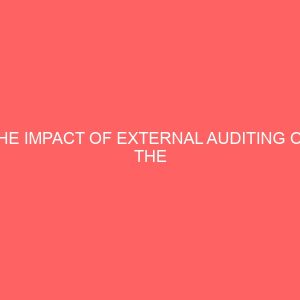Description
THIS RESEARCH WORK IS ON THE OPPORTUNITIES AND CHALLENGES OF NEW PENSION SCHEME FOR FINANCIAL INSTITUTION.
CHAPTER ONE
1.0 INTRODUCTION
1.1 OVERVIEW OF THE STUDY
The inevitability of ageing has made retirement a natural normal phenomenon in the world of work. The importance of work lies in the fact that it determines the social and economic status of an individual and influences, philosophy, attitude, dressing, behavior and belief of an individual. However, despite the magnitude of work to individuals and wellness of society in general work is exhaustible to individuals, hence workers must disengage from work (retire). Therefore, retirement is a stage in life that is normal for any worker (public or privated) that do not die in active services.
The life span of an individual is divided into three phases, in which retirement is one. The first phase: period of birth up to time of schooling or training before employment.
The second phase: period of work, an individual at this stage engage in activities for financial reward.
The third phase: is the period of retirement, is the point of severance from work, which falls under the ambit of disengagement theory in social gerontology. Here, the inevitability of death makes death a normal and natural occurrence. People must disengage so that the social system will not be disrupted when an individual dies.
Retirement is not tantamount to redundancy neither a palliative period, but a time of self freedom without the compulsion of work dictates in which an individual is free to spend his/her time as wished.
1.2 BACKGROUND INFORMATION
Historically, Nigeria as a country inherited the British pension scheme, British Nigerian Social Insurance Trust Fund (NSITF) is the premier pension scheme in Nigeria. In 1962 National providence fund was established as compulsory savings for workers in the private sector. In 1974, amendment was made which retained the private sector within the National provident Fund. While in 1993, National Social Insurance Trust Fund was converted, into a limited Social Insurance Scheme.
President Oluwasegun Obasanjo regime enacted the pension reform Act in 2004. The act decentralize and privatize pension administration in Nigeria. The law certified National Pension Commission (Pencom) as the supervising and regulatory body to oversee the activities of registered pension fund Administrators (PFA). Through the Submission process, the new pension scheme has made pension an integral exercise of public private partnership. Individual workers do contribute and have the choice of adopting preferred fund administrators. In addition, for the first time the history of Nigeria, pension fund is a source of fund for investment purpose. Hence, it becomes an employment generation Scheme as the Pension Fund Administrators have employed personnel thereby creating avenue for employment opportunities. Finally, it has attracted foreign investment that has open up the Nigerian economy to positive side of globalization.
1.3 STATEMENT OF PROBLEM
Most pension scheme in the public sector had been under, funded, owing to inadequate budgetary allocations.
The administration of the scheme was generally weak, inefficient and non transparent.
Most pension scheme was designed as resignation” scheme rather than “retirement” scheme.
Generally, the pension schemes in Nigeria were largely unregulated, without any standard or supervision and highly diversified before the advent of the PRA 2004 (Hassana, 2008).
1.4 OBJECTIVE OF THE STUDY
- To ensure that every person who worked either in the financial institution of the federation, federal capital territory or the private sector receives his entitlement as and when due.
- To assist improvident individuals by ensuring that they save in order to cater for their livelihood during old age.
- To establish a uniform set of rules, regulations and standards for administration and payment of retirement benefits for the financial institution of the federation, federal capital territory and the private sector.
1.5 RESEARCH QUESTIONS
The following questions were raised in the process of caring out this research
- What is the relationship between opportunities and Challenges of new pension scheme and financial institution?
- What is the nature of the interaction between the opportunities and Challenges of new pension scheme and the financial institution?
- What is the method of communication between the opportunities and Challenges of new pension scheme and the individual?
1.6 RESEARCH HYPOTHESIS
Ho: there is no significant relationship between opportunities and Challenges of new pension scheme and financial institution
Hi: there is significant relationship between opportunities and Challenges of new pension scheme and financial institution.
Ho: opportunities and Challenges of new pension scheme does not contribute to the financial institution.
Hi: opportunities and Challenges of new pension scheme contribute to the financial institution.
Ho: opportunities and Challenges of new pension scheme role is not important to the financial institution.
Hi: opportunities and Challenges of new pension scheme is important to the financial institutions.
1.7 SIGNIFICANCE OF THE STUDY
This research project will be of more importance to the individuals and the workers of the financial institution or public sector.
1.8 SCOPE OF THE STUDY
The research focus attention on the opportunities and challenges of new pension scheme of UBA and First Bank
1.9 DEFINITION OF TERMS
Pension: this has been defined as a deferred salary that is paid during a workers retirement.
Pension scheme: is a system designed to provide employees of an organization with a means of securing on retirement a standard of living reasonably consistent with that which they enjoyed while in service.
Retirement: this mean sessation of service.
REFERENCES
Barr, N. (1995) “Comment on Government Provision and Regulation of Economic Support in Old Age” World Bank Conference on Development Economics (A B C D E).
DIAMOND, p. (1995). “Government Provision and Regulation of Economic Support in Old Age (A B C D E).
Orszage, J.M PR Orszag (2000), “the Benefits of Flexible Funding: Implications for Pension Reform in an uncertain World.








Reviews
There are no reviews yet.